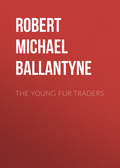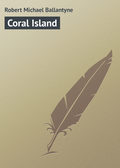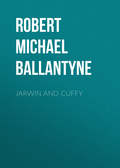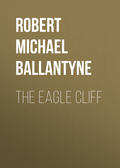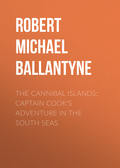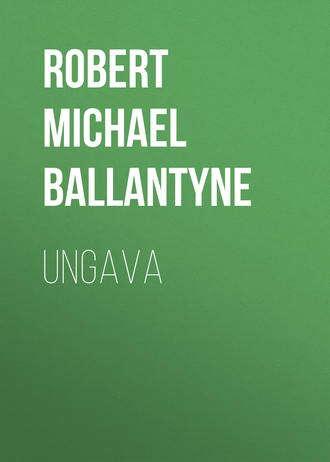
Robert Michael Ballantyne
Ungava
Chapter Seventeen.
Successes and encouragement—Bryan lost and found
It was evening before the tide began to fall and uncover the stake-nets, which were eagerly and earnestly watched by those who had remained in the camp. Mrs Stanley and Edith were seated on an empty box by the margin of the sandy bay; Mr Stanley sat on a nail-keg beside them; La Roche and the Indian were still working at the small canoe a few yards from the tent; and Gaspard, with folded arms, and an unusual smile of good humour playing on his countenance, stood close behind Stanley.
None of the hunting and exploring parties had returned, although the sun had long since disappeared behind the mountains, and the mellow light of evening was deepening over the bay.
“There’s a tail, sir,” said Gaspard, as he hurried towards the net.
“So it is!” cried Stanley, leaping up. “Come along, Eda, and take the first fish.”
Edith needed no second invitation, but bounded towards the edge of the water, which was now gradually leaving the nets. Gaspard had already disengaged a white fish from the mesh, and wading to the beach, gave it to the little girl, who ran with it joyously to her mother. Meanwhile, another and another fish was left by the tide, and Stanley soon after brought up a splendid salmon of about twenty-five pounds weight, and laid it at Edith’s feet.
“Oh, how very beautiful!” cried the child, as she gazed in delight at the silvery scales of the fish.
“My mind is much relieved by this, Jessie,” said Stanley, reseating himself on the keg, while Oostesimow and La Roche carried the fish ashore as Gaspard freed them from the nets. “I now see that there are plenty of fish in the river, and if the hunters bring in a good report to-night, our anxiety on the score of food will be quite removed.”
Although none of the party had ever set a net on stakes before, they had frequently heard of this manner of fishing, and their first attempt proved eminently successful. At low tide stakes had been driven into the sand, extending from the edge of the water towards high-water mark. On these the nets had been spread, and thus the misfortune which had attended the setting of the nets with floats and sinkers was avoided. The quantity of fish taken gave promise of an ample supply for the future. There were two Hearne-salmon (that is, spotted like trout), and one large common salmon, besides thirty white-fish, averaging between two to six pounds weight each, all of which were in excellent condition. The white-fish is of the salmon species, but white in the flesh, and being less rich than the salmon, is much preferred by those who have to use it constantly as an article of food.
“This is a most fortunate supply,” remarked Stanley, “and will prevent the necessity of putting the men on short allowance.”
“Short allowance!” exclaimed his wife; “I thought we had more than enough of food to last us till the arrival of the ship.”
“Ay, so we have. But until now I did not feel at liberty to use it; for if through any accident the ship does not come, and if there had chanced to be no fish in the river, the only course open to us would be to retrace our steps, and as that would be a long and slow process, we would require to economise our food. In fact, I had resolved to begin operations by putting the men on short allowance; but this haul of fish shows me that we shall have more than enough.
“But who comes here?” he added, on observing the figure of a man approaching the camp. “He seems to carry a burden on his back, as far as I can make out in the uncertain light.”
“Did any of the men go out alone?” inquired Mrs Stanley.
“No; but I suppose that this one must have separated from his comrade.—Hallo! who goes there?”
The man tossed the bundle from his shoulders, and hastening forward revealed the flushed countenance of Frank Morton.
“What! Frank! why, man, you seem to have had a hard day of it, if I may judge by your looks.”
“Not so hard but that a good supper will put its effects to flight,” replied Frank, as he rested his gun against a rock and seated himself on the keg from which Stanley had risen. “The fact is, I have slain a noble buck, and being desirous that the men should have as much of it as possible, I loaded myself rather heavily. The ground, too, is horribly bad; but pray send Gaspard for the bundle. I should have been here sooner but for the time required to dissect the animal.”
“Where is Bryan, Frank?” inquired Mrs Stanley. “You went away together.”
“Bryan! I know not. He and I parted in the mountains some hours ago; and as he failed to keep his appointment with me, I concluded that he must have become foot-sore and returned to camp.”
“He has not returned,” said Stanley; “but I have no fear for the honest blacksmith. He’s too old a nor’wester to lose himself, and he’s too tough to kill. But come, Frank, let us to our tent. I see that La Roche has already prepared our salmon for the kettle, and so—”
“Salmon!” interrupted Frank.
“Ay, lad, salmon! a twenty-five pounder too! But come, change your foot-gear, and then we shall have our supper, in the course of which we shall exchange news.”
As they proceeded towards the camp the voices of some of the men were heard in the distance; it was now too dark to see them. In a few minutes François, followed by Augustus and Ma-istequan, strode into the circle of light around the fire, and laying aside their guns proceeded to light their pipes, while they replied to the questions of Frank and Stanley.
“You do not come empty-handed,” remarked the latter, as François and his comrades threw down several fat ducks and a few grouse, which, after the fashion of hunters, they had carried pendent by the necks from their belts.
“We only shot a few, monsieur,” replied François, “to put in the kettle for supper. We might have loaded a canoe had we chosen.”
“That is well,” said Stanley; “but the kettle is full already, and supper prepared. See, Frank has shot a deer, so that we shall fare well to-night.—Ah, Prince! come along. What! more game?” he added, as Dick and Massan entered the halo of light, and threw down the choice morsels of a fat deer which they had killed among the mountains.
“Ah! oui, monsieur,” said Massan, chuckling as he laid aside his axe and gun; “we might ha’ killed three o’ them if we had been so minded; but we couldn’t ha’ brought them into camp, an’, as Dick said, ’tis a pity to kill deer to feed the wolves with.”
“Right!” exclaimed Frank; “but did any of you see Bryan? He gave me the slip in the mountains, and, I fear, has lost himself.”
To this the men replied in the negative, and some of them smiled at the idea of the blacksmith being lost.
“No fear, vraiment! He no lost,” cried La Roche with a laugh, as he lifted the huge kettle from the fire and placed it in the midst of the men, having previously abstracted the best portions for the special benefit of his master. “No fear of Bryan, certainment; he like one bad shilling—he come up toujours. Ah! mauvais chien, him give me all de trouble ov get supper ready mylone.”
“I trust it may be so,” said Stanley. “We are all here except him and Oolibuck, whom I have sent to the coast for a few days to watch for the ship. But let us have supper, La Roche, and spread ours nearer the fire to-night—it is rather cold; besides, I want to hear the reports of the men.”
In compliance with this order, the lively Frenchman spread the supper for his master’s family close beside that of the men, and in a few minutes more a most vigorous attack was made on the viands, during the first part of which the hungry travellers maintained unbroken silence. But as the cravings of nature began to be satisfied, their tongues found time to remark on the excellence of the fare. The salmon was superb. Even Edith, who seldom talked about what she ate, pronounced it very good. The white-fish were better than any of the party had ever eaten in their lives, although most of them had travelled over the length and breadth of the North American wilderness. The ducks were perfect. Even the ptarmigan were declared passable; and the venison, with an inch of fat on the haunches—words were not found sufficiently expressive to describe it. Those who are philosophically inclined may suspect that some of this super-excellence lay in the keen appetites of the men. Well, perhaps it did.
While the travellers were in the midst of this, and ere yet their tongues were fairly loosened, a loud unearthly shout rang with appalling reverberations among the surrounding cliffs, causing the entire party to start up and rush for their arms. Again the cry was heard.
“Ah! bad skran to ye, Losh!—Hould on, Moses, ye fat villain. Lave me wan mouthful, jist wan, to kape me from givin’ up the ghost intirely.”
A shout of laughter greeted the advent of Bryan’s voice, but it was nothing to the peals that burst forth on the appearance of that individual in propria persona. To say that he was totally dishevelled would convey but half the truth. Besides being covered and clotted with mud, he was saturated with water from head to foot, his clothes rent in a most distressing manner, and his features quite undistinguishable.
“Why, Bryan, what ails you? Where have you been?” inquired Stanley, in a tone of sympathy.
“Bin, is it? Sorra wan o’ me knows where I’ve bin. It’s mysilf is glad to be sartin I’m here, anyhow.”
“I’m glad you’re certain of it,” said Frank, “for if it were not for the sound of your voice, I should doubt it.”
“Ah monsieur,” said La Roche, “make your mind easy on dat. No von but Bryan ever regard de kettle dat way.”
“Taizy voo, ye petit varmint,” said Bryan, approaching the said kettle, and smiling rapturously through the mud that encrusted his face on beholding its contents. Without waiting to change his garments the hungry blacksmith began supper, having first, however, directed attention to the bag which he had brought in. From this bag La Roche now extracted about a dozen trout, some of which were of great size—especially one, whose bulk exceeded that of the large salmon.
“There’s plinty more where thim comed from,” said Bryan, through a mouthful of venison; “but I’ll tell ye ov it afther supper.”
“Ah, true! don’t let us interrupt him just now,” said Stanley. “In the meantime, François, since you seem to be about done, tell us what you have seen, and let us hear what you have to say of the country.”
François having lighted his pipe, cleared his throat and began:—
“Well, monsieur, after we had paddled a short bit beyond the point below the last rapid in Caniapuscaw River, we shoved the canoe ashore, and landed Prince and Massan, who set off to look for game, leavin’ Augustus, Ma-istequan, and me to paddle up the river as well as we could. But we soon found that three men in a big canoe could not make much way agin the strong current of the river, so we put ashore again and took to our legs.
“After making a long tramp up the banks o’ the river, we fell in with some good-sized pines; but although they are big for this part of the country, they are not big enough for building. Then we pushed into the gullies, which are sheltered from the cold winds off the bay, and here we found the trees a good deal bigger. There are pines and larch in abundance, and some of the larch are even bigger than we require.”
“Are they far inland?” inquired Stanley.
“No, monsieur, they are only a few hundred yards from the banks of the river, and growin’ on the edge of a small creek, which I noticed is deep enough to float them down.”
“Good, very good,” said Stanley, filling his pipe with a fresh charge of tobacco; “that is most fortunate, for it will save time, and take fewer men to bring them here. Go on, François.”
“Bien, monsieur. Then I felled one or two o’ the trees, to see what like they are; and I found that they are very tough and good. The pines are firmer and tougher than any I ever saw in the Indian country, owing, I suppose, to their stunted growth. While I was thus employed, Augustus shot the grouse we brought home, and we saw a great many coveys of them. In fact, we might have shot many more; but as we did not know how far we should have to walk, we thought it best not to burden ourselves too much. We also saw a great many ducks, and shot a few, as you see.”
“Did you see goose?” inquired La Roche, whose mind had a natural tendency to culinary matters.
“No,” replied François, “I saw no geese; but I did not go out of my way to look for them. I was more taken up with the timber than replenishing the kettle.”
“Ah! that ver’ great pity. Oui, grand dommage. De kittle toujours de most importance t’ing on de voyage. If you forget him, you goot for not’ing. Mais, François, did you look into the deep clear pool at de foot of de rapid?”
François emitted a cloud of smoke with a negative in the middle of it.
“An!” said La Roche with a sigh, “I thought not; mais it was pity. You see one goose for certain, if you have look straight down into dat pool.”
“Bien,” continued François, turning to Stanley. “I then went into one or two more gullies, and saw some more sticks fit for building; but after all it is only in the gullies they grow, and there are not very many. The trees on the banks of the river are chiefly pines, and only fit for firewood.”
“And an important item is firewood, as we shall find ere long,” remarked Stanley. “Your account of the timber is very satisfactory, François. Did you see traces of Indians or Esquimaux?”
“No; I saw none.”
“Perhaps you did, Prince,” continued Stanley, turning to that worthy, who was stretched, along with Massan, at full length before the blaze, and had been listening attentively to the conversation while he solaced himself with his pipe.
“Yes, sir, we seed the marks they left behind them,” answered Prince, while he glanced towards Massan, as if to invite him to give the desired information.
“Ay, we saw their marks, no doubt,” said the guide, knocking the ashes out of his pipe, and raising himself from his reclining posture to that of a tailor, the more conveniently to recharge that beloved implement. “Ay, we saw their marks, and they was by no means pleasant to look on. After we had landed above the p’int, as François told ye, Dick Prince and me went up one o’ the gullies, an’ then gettin’ on one o’ them flat places that run along the face of all the mountains hereabouts, we pushed straight up the river. We had not gone far when, on turnin’ a p’int, we both clapped eyes at the same moment on the most ill-lookin’ blackguard of a wolf I ever saw. Up went both our guns at once, and I believe we were very near puttin’ a bullet in each of his eyes, when we noticed that these same eyes were not bookin’ at us, but starin’, most awful earnest like, up a gully in the mountains; so we looked up, an’, sure enough, there we saw a deer on the mountain-top, tossin’ its head and snuffin’ round to see that the coast was clear before it came down to the water. We noticed that a regular beaten deer-track passed down this gully, and master wolf, who knowed the walk very well, was on the lookout for his dinner; so we waited quiet till the deer came down, an’ Dick put a bullet in its heart, an’ I put one into the wolf’s head, so they both tumbled down the cliffs together. The shot made another deer, that we had not seen, start off into the river; but before it got a few yards from the shore, Dick loaded again and put a bullet into its head too, an’ it was washed ashore at the p’int below us.
“Havin’ fixed them off comfortably, we cut up the deer, and put all we could carry on our shoulders, for we knowed that if we left them we’d find nothin’ but the bones when we came back. About an hour after this we came upon a deserted camp of Indians. It was so fresh that we think they must have passed but a few weeks ago. The whole camp was strewed with bones of deer, as if the red varmints had been havin’ a feast. An’ sure enough, a little farther on we came upon the dead carcasses of ninety-three deer! The rascals had taken nothin’ but the tongues an’ tit-bits, leavin’ the rest for the wolves.”
“Ay, they’re a reckless, improvident set,” remarked Stanley. “I’ve been told that the Esquimaux are quite different in this respect. They never kill what they don’t require; but the redskins slaughter the deer by dozens for the sake of their tongues.”
“We also found the broken head of an Esquimau seal-spear, and this little bit of sealskin.” Massan handed these as he spoke to Stanley.
“I fear,” said Frank, “this looks as if they had made an attack on the Esquimaux very recently.”
“I fear it much,” said Stanley, examining the little shred of sealskin, which had beautifully glossy hair on one side, and on the other, which was dressed, there were sundry curious marks, one of which bore a rude resemblance to an Indian wigwam, with an arrow pointing towards it.
“I found the bit o’ sealskin hanging on a bush a little apart from the place where they camped, an’ from what I’ve seen o’ the ways o’ redskins, it’s my ’pinion that it was put there for some purpose or other.”
“Very likely.—Take care of it, Jessie,” said Stanley, throwing it to his wife; “it may be explained some day.—Well, Massan, did you see any other animals?”
“Yes, sir, lots o’ them. We saw deer on the hill-tops, and might ha’ shot more o’ them if we could have brought them into camp. An’ we saw porcupines in all the pine bluffs. An’ we saw fish in the lakes among the mountains. There are lots o’ them lakes—small things some o’ them—in all the gullies, and fish in most o’ them; but we had neither lines nor hooks, so we catched none.”
“Faix, if ye catched none, yer betters catched plinty,” said Bryan, who, having concluded supper and changed his garments, was now luxuriating in a smoke. The blacksmith pointed as he spoke to the bag of splendid trout which lay at a short distance from the fire. “’Tis mysilf’s the boy to catch them. I would have brought ye two times as much, if it wasn’t that I lost my hook and line. I think it must have bin a fresh-water whale, the last wan, bad luck to it! for it pulled me into the wather three times, an’ wint off at last with two fathom o’ cod-line trailin’ behind it.”
“So then, Bryan,” said Frank, “it must have been the yells with which you accompanied your fishing that frightened the deer I was after and caused me to lose him. However, as I got another soon afterwards which must have been frightened towards me by the same halloos, I forgive you.”
Frank now gave the party an account of what he had seen, but as his experience merely corroborated that of Dick Prince and Massan, we will not trouble the reader with the details. The evidence of the various exploring parties, when summed up, was undoubtedly most satisfactory, and while it relieved the mind of the leaders of the band, it raised and cheered the spirits of the men. Timber, although not plentiful or very large, was to be had close to the spot where they proposed to erect their fort; game of all kinds swarmed in the mountains in abundance; and the lakes and rivers were well stocked with excellent fish: so that, upon the whole, they considered that they had made an auspicious commencement to their sojourn in the land of the Esquimaux.
Chapter Eighteen.
Outpost-building—Fort Chimo—An unexpected arrival, which causes much joy
The band of fur-traders now set earnestly about the erection of their winter dwelling. The season was so far advanced that the men could no longer be spared from the work to hunt or fish in the mountains, so that they lived chiefly on the produce of the stake-nets in front of the camp, and a small allowance of the provisions with which they had started from Moose Fort. Occasionally Frank sallied forth and returned with the best parts of a deer on his shoulders; but these excursions were rare, as both he and Stanley worked with the men in the erection of the fort. No one was idle for a moment, from the time of rising—shortly after daybreak—to the time of going to rest at night. Even little Edith found full occupation in assisting her mother in the performance of a host of little household duties, too numerous to recapitulate. The dog Chimo was the only exception to the general rule. He hunted the greater part of the forenoon, for his own special benefit, and slept when not thus occupied, or received with philosophical satisfaction the caresses of his young mistress.
The future fort was begun on the centre of the level patch of green-sward at the foot of the flat rock by the spring, where the party had originally encamped. A square was traced on the ground to indicate the stockade; and within this, Stanley marked off an oblong patch, close to the back stockade, for the principal dwelling-house, facing the river. Two other spaces were on either side of this—one for a store, the other for a dwelling for the men. When finished, the fort would thus have the form of three sides of a square surrounded by a stockade. In the centre of this, and the first thing that was erected, was a flag-staff, on which the H.B.C.—Hudson’s Bay Company—flag was hoisted, and saluted with three cheers as its crimson folds fluttered out in the breeze for the first time. The plan on which the houses were constructed was that on which all the dwellings of the fur-traders are built—namely, a framework of timber, the interstices of which are filled up with logs sliding into grooves cut in the main posts and beams. This manner of building is so simple that a house can be erected without any other instruments than an axe, an auger, and a large chisel; and the speed with which it is put up would surprise those whose notions of house-building are limited to stone edifices.
The axes of the wood-cutters resounded among the gullies and ravines of Ungava, and awakened the numerous echoes of the mountains. The encampment no longer presented a green spot, watered by a tiny rill, but was strewn with logs in all stages of formation, and chips innumerable. The frameworks of the dwelling-houses began to rise from the earth, presenting, in their unfinished condition, a bristling, uncomfortable appearance, suggesting thoughts in the beholder’s mind highly disparaging to art, and deeply sympathetic with outraged nature. The tents still stood, and the campfire burned, but the superior proportions of the rising fort threw these entirely into the shade. A rude wharf of unbarked logs ran from the beach into the river. It had been begun and finished in a couple of days, for the convenience of Gaspard while visiting his nets, as he sometimes did before the water left them. Everything, in short, bore evidence of the most bustling activity and persevering energy; and in a few weeks from the time of their first landing, the dwelling-houses were sufficiently weather-tight to be habitable, and the other portions of the establishment in an advanced condition.
The openings between the logs of the houses were caulked with a mixture of mud and moss, and left in that condition in the meantime, until the pit-saw could be set to work to produce boards for the better protection of the walls without and within. The window and door frames were also made, and covered temporarily with parchment, until the arrival of the ship should enable them to fill the former with glass and the latter with broad panels.
The effect of the parchment-covered door, however, was found to be somewhat troublesome. Being large, and tightly covered, it sounded, when shut violently, with a noise so strongly resembling the report of a distant cannon that, during the first day after its erection, the men more than once rushed down to the beach in the expectation of seeing the long and ardently wished-for ship, which was now so much beyond the time appointed for her arrival that Stanley began to entertain serious apprehensions for her safety. This ship was to have sailed from York Fort, the principal depôt of the fur-traders in Hudson’s Bay, with supplies and goods for trade with the Esquimaux during the year. She was expected at Ungava in August, and it was now September. The frost was beginning, even at this early period, to remind the expedition of the long winter that was at hand, and in the course of a very few weeks Hudson’s Straits would be impassable; so that the anxiety of the traders was natural.
Just before the partitions of the chief dwelling-house were completed, Stanley went to the tent in which his wife and child were busily employed in sewing.
“Can you spare Edith for a short time, wife?” said he, as his partner looked up to welcome him.
“Yes, for a short time; but she is becoming so useful to me that I cannot afford to spare her long.”
“I’m afraid,” said Stanley, as he took his child by the hand and led her away, “that I must begin to put in my claim to the services of this little baggage, who seems to be so useful. What say you, Eda; will you allow me to train you to shoot, and fish, and walk on snow-shoes, and so make a trader of you?”
“I would like very much, papa, to learn to walk on snowshoes, but I think the gun would hurt me—it seems to kick so. Don’t you think I am too little to shoot a gun off?”
Stanley laughed at the serious way in which the child received the proposal.
“Well, then, we won’t teach you to shoot yet, Eda; but, as you say, the snow-shoe walking is worth learning, for if you cannot walk on the long shoes when the snow falls, I fear you’ll not be able to leave the fort at all.”
“Yes, and François has promised to make me a pair,” said Edith gaily, “and to teach me how to use them; and mamma says I am old enough to learn now. Is it not kind of François? He is always very good to me.”
“Indeed it is very kind of him, my pet; but all the men seem to be very good to you—are they not?”
“Oh yes!—all of them. Even Gaspard is kind now. He never whips Chimo, and he patted me on the head the other day when I met him alone in the ravine—the berry ravine, you know, where I go to gather berries. I wonder if there are berries in all the other ravines?—but I don’t care much, for there are thousands and thousands of all kinds in my own ravine, and—where are you going, papa?”
This abrupt question was caused by her father turning into the square of the new fort, in which the most of the men were at work.
“I’m going to show you our house, Eda, and to ask you to fix on the corner you like best for your own room. The partitions are going to be put up, so we must fix at once.”
As he spoke they passed through the open doorway of the new dwelling, which was a long, low building; and, placing his little daughter in the centre of the principal hall, Stanley directed her to look round and choose a corner for herself.
For a few minutes Edith stood with an expression of perplexity on her bright face; then she began to examine the views from each of the corner windows. This could only be done by peeping through the bullet-hole in the parchment skins that in the meantime did duty for glass. The two windows at the back corners looked out upon the rocky platform, behind which the mountains rose like a wall, so they were rejected; but Edith lingered at one of them, for from it she saw the spring at the foot of the rock, with its soft bed of green moss and surrounding willow-bushes. From the front corner on the left hand Cross Island and the valley of the river beyond were visible; but from the window on the right the view embraced the whole sweep of the wide river and the narrow outlet to the bay, which, with its frowning precipices on either side, and its bold flanking mountains, seemed a magnificent portal to the Arctic Sea.
“I think this is the nicest corner,” said Edith, turning with a smile to her father.
“Then this shall be yours,” said Stanley.
“But,” exclaimed Edith, as a sudden thought occurred to her, “perhaps Frank would like this corner. I would not like to have it if Frank wants it.”
“Frank doesn’t want it, and Frank shan’t have it. There now, run to your mother, you little baggage; she can’t get on without you. Off you go, quick!”
With a merry laugh Edith bounded through the doorway, and disappeared like a sunbeam from the room.
On the 25th of September, Stanley was standing on the beach, opposite the fort, watching with a smile of satisfaction the fair, happy face of his daughter, as she amused herself and Chimo by throwing a stick into the water, which the latter dutifully brought out and laid at her feet as often as it was thrown in. Frank was also watching them.
“What shall we call the fort, Frank?” said his companion. “We have a Fort Good Hope, and a Fort Resolution, and a Fort Enterprise already. It seems as if all the vigorous and hearty words in the English language were used up in naming the forts of the Hudson’s Bay Company. What shall we call it?”
“Chimo! Chimo! Chimo!” shouted Edith to the dog, as the animal bounded along the beach.
Both gentlemen seemed to be struck with the same idea simultaneously.
“There’s an answer to your question,” said Frank; “call the fort ‘Chimo.’”
“The very thing!” replied Stanley; “I wonder it did not occur to me before. Nothing could be more appropriate. I salute thee, Fort Chimo,” and Stanley lifted his cap to the establishment.
In order that the peculiar appropriateness of the name may appear to the reader, it may be as well to explain that Chimo (the i and o of which are sounded long) is an Esquimau word of salutation, and is used by the natives when they meet with strangers. It signifies, Are you friendly? by those who speak first, and seems to imply, We are friendly, when returned as an answer. So well known is the word to the fur-traders who traffic with the natives of Hudson’s Straits that they frequently apply it to them as a name, and speak of the Esquimaux as Chimos. It was, therefore, a peculiarly appropriate name for a fort which was established on the confines of these icy regions, for the double purpose of entering into friendly traffic with the Esquimaux, and of bringing about friendly relations between them and their old enemies, the Muskigon Indians of East Main.



